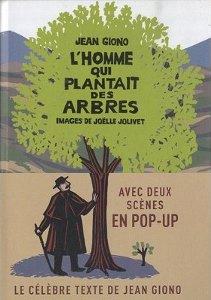The Man Who Planted Trees

French cover for the pop-up version of the book.
|
|
| Author | Jean Giono |
|---|---|
| Original title | L'homme qui plantait des arbres |
| Genre | Fiction |
|
Publication date
|
1953 |
The Man Who Planted Trees (French title L'homme qui plantait des arbres) is an allegorical tale by French author Jean Giono, published in 1953.
It tells the story of one shepherd's long and successful singlehanded effort to re-forest a desolate valley in the foothills of the Alps in Provence throughout the first half of the 20th century. The tale is short—only about 4000 words long. It was written in French, but first published in English.
The story begins in the year 1913, when this young man is undertaking a lone hiking trip through Provence, France, and into the Alps, enjoying the relatively unspoiled wilderness.
The narrator runs out of water in a treeless, desolate valley where only wild lavender grows and there is no trace of civilization except old, empty crumbling buildings. The narrator finds only a dried up well, but is saved by a middle-aged shepherd who takes him to a spring he knows of.
Curious about this man and why he has chosen such a lonely life, the narrator stays with him for a time. The shepherd, after being widowed, has decided to restore the ruined landscape of the isolated and largely abandoned valley by single-handedly cultivating a forest, tree by tree. The shepherd, Elzéard Bouffier, makes holes in the ground with his curling pole and drops into the holes acorns that he has collected from many miles away.
The narrator leaves the shepherd and returns home, and later fights in the First World War. In 1920, shell-shocked and depressed after the war, the man returns. He is surprised to see young saplings of all forms taking root in the valley, and new streams running through it where the shepherd has made dams higher up in the mountain. The narrator makes a full recovery in the peace and beauty of the regrowing valley, and continues to visit Bouffier every year. Bouffier is no longer a shepherd, because he is worried about the sheep affecting his young trees, and has become a bee keeper instead.
...
Wikipedia
